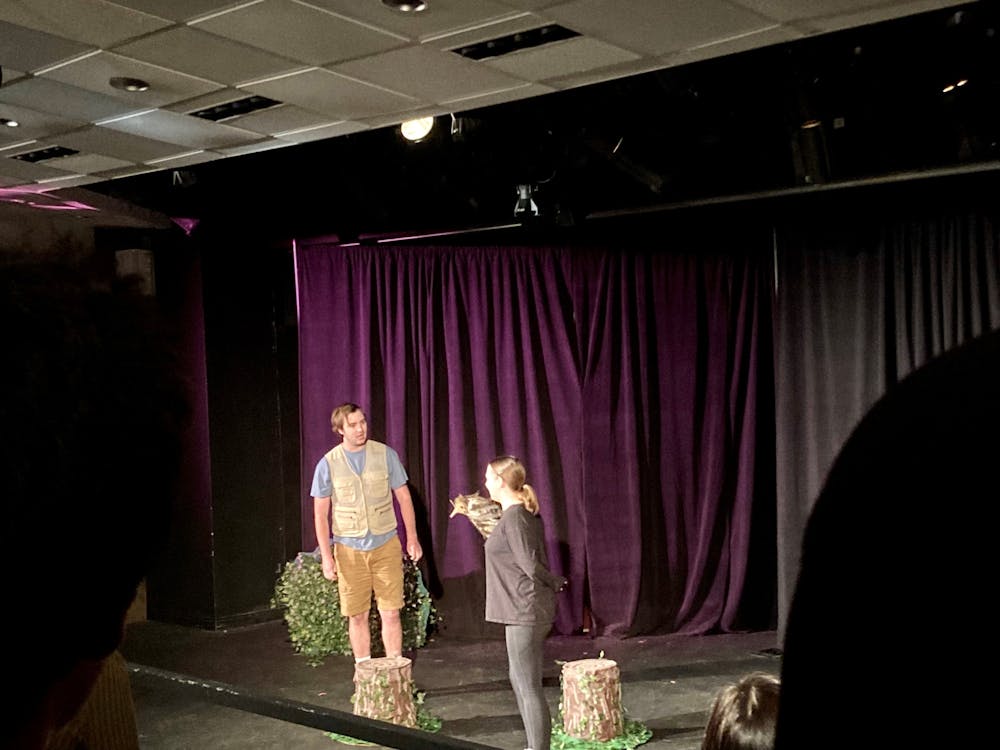There’s something special about the excitement of a theater minutes before the lights go down. People are flipping through the programs or chatting with their friends, and theater group members are doing their last checks and preparations before showtime. You can never know for sure exactly what kind of show you’re going to be in for. For my part, I didn’t have any clue, beyond the names of the plays: Uncomfortable Spotlights, The Curse of Having a Big Heart, The Whip-Poor-Will and Angelus Mortis.
Witness Theater is a student-run theater group at Hopkins. They’re unique among the theater groups on campus because all of their shows are entirely written, produced and directed by students. I felt that it really came through in the themes of the plays that were put on in their Fall Showcase, which was held in the Arellano Theater from Oct. 6–8. These are plays that have a unique freedom to be intensely contemporary and sensitive to the concerns and cultural mindset of the student body at Hopkins.
The first play was Uncomfortable Spotlights, which was written by Yara Changyit-Levin and directed by Yona Levine. The play focused around a group of girls chilling in the theater at a Midwestern high school — a laid-back theater teacher, a freshman at Hopkins who’s come back to visit her old schoolmates, a senior worried about her grades and getting into college and a 10th grader afraid of growing up and leaving home.
I thought that this play really excelled in the way it was able to capture a lot of the common fears and anxieties of students at Hopkins. From its portrayal of the stress of exam grades to fears of having to grow up and leave your old friends behind, it touched on a lot of important concepts.
The main conflict of the play centered around the high school senior who kept asking her friend, the freshman at Hopkins, about what the university was like. The Hopkins freshman was withdrawn and cagey about her experience until, finally, she burst out about how lonely she felt at her new school and about how everyone wanted to know about Hopkins but no one wanted to know about her own experience and emotions.
The second play was The Curse of Having a Big Heart, written by Cameron Thiesing and directed by Ander Diez. It focused on a woman who tries to balance her life with her partner and son with her nightly activities as the superhero Aurora. The story and themes were a little conventional, focusing on the ideas of never being able to save everyone and the necessity of reserving time and space for yourself despite important responsibilities.
Despite that, I thought that the pacing and plot structure were well done, and the execution of dialogue and character development was solid, which made the play very easy to watch and be drawn into. I was especially interested in the play’s use of news reports and voicemails as tools to move the plot forward and provide exposition to the audience.
After an intermission, the third play of the night was The Whip-Poor-Will, written by Gemma Watson and directed by Liesel Arauz Vallecillo. In it, a husband and wife are walking through the forest on a birding trip. Through their conversation, it’s revealed that they have a transgender daughter who will be acting as their eldest daughter’s bridesmaid in an upcoming wedding. The mother, aptly named Faith, is supportive, but the father, George, is unsupportive.
Over the course of the play, George has a conversation with a talking whip-poor-will (a type of bird) where he tries to explain the concept of masculinity and explains why he’s so uncomfortable with his daughter being trans. But in trying to explain it and conversing with the bird, he voices the truth that he’s just afraid that his daughter will be treated badly by others, before realizing that he’s doing that exact same thing to her himself.
The acting in this play was wonderful. There were moments during it when I genuinely felt close to tears. The character of George was very well crafted, and he truly felt like a three-dimensional character whose development I became invested in. The whip-poor-will was a whimsical and energetic character who did a lot to add comedic levity to break up some of the heavy themes of transphobia, but also sincerely delivered many insightful comments about the social construct of gender.
The final play of the night was Angelus Mortis, written by Kate Ketelhohn and directed by Kevin Kim. In contrast to the earlier plays, this was a much more conceptual piece about the idea of life and death. The main character was a grim reaper, learning how to reap souls and questioning his responsibilities as he had to cause death after death.
I thought that this play was especially stunning in its set design and physical acting. There was a recurring action of the reaper pulling out a pair of silver scissors, drawing out the invisible thread of the lifeline, snipping it and then the body going limp as if it were a puppet with cut strings. It was visually stunning and was an interesting thought piece on the idea of mortality.
Overall, the plays that Witness Theater put on in its Fall Showcase were wonderful. As always, I’m endlessly impressed by the talent of the Hopkins student body. There’s something special about these student-written plays in that they can truly reveal the current concerns of Hopkins undergraduates. Ideas of growing up, being overwhelmed by responsibility, dealing with discrimination and the importance of human connection were all central to the performances. It was truly a wonderful evening at the theater.





